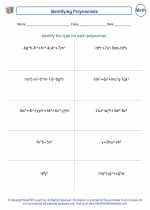Polynomials and Exponents
Polynomials
A polynomial is an algebraic expression consisting of variables and coefficients, involving only the operations of addition, subtraction, multiplication, and non-negative integer exponents of variables. The general form of a polynomial is:
P(x) = an*x^n + an-1*x^(n-1) + ... + a1*x + a0
Where:
- P(x) is the polynomial function
- an, an-1, ..., a1, a0 are the coefficients
- x is the variable
- n is a non-negative integer representing the degree of the polynomial
Exponents
An exponent refers to the number of times a number or expression, called the base, is multiplied by itself. The general form of an exponent is:
a^b
Where:
Operations with Polynomials
When working with polynomials, various operations such as addition, subtraction, multiplication, and division can be performed. These operations follow specific rules and properties, such as the distributive property, commutative property, and associative property.
Exponent Rules
When dealing with exponents, there are several important rules to keep in mind, such as the product rule, quotient rule, power rule, and zero exponent rule. These rules help simplify expressions and solve equations involving exponents.
Study Guide
To master polynomials and exponents, it's important to understand the following key concepts:
- Identifying the terms, coefficients, and degree of a polynomial
- Performing addition and subtraction of polynomials
- Applying the distributive property to simplify polynomial expressions
- Multiplying and dividing polynomials using appropriate methods
- Understanding the rules of exponents and applying them to simplify expressions
- Solving polynomial equations and word problems
Practice is essential for gaining proficiency in these topics. Work through problems involving polynomials and exponents, and make use of resources such as textbooks, online tutorials, and practice worksheets to reinforce your understanding.
Remember, mastering polynomials and exponents will not only help you in algebra, but also in various fields of mathematics and real-world applications.
.◂Math Worksheets and Study Guides Eighth Grade. Polynomials and Exponents
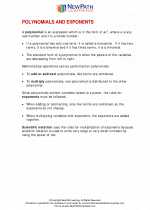
 Worksheet/Answer key
Worksheet/Answer key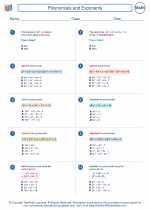
 Worksheet/Answer key
Worksheet/Answer key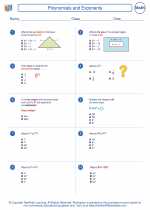
 Worksheet/Answer key
Worksheet/Answer key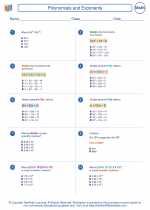
 Worksheet/Answer key
Worksheet/Answer key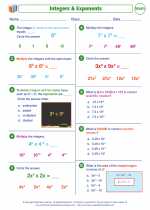
 Worksheet/Answer key
Worksheet/Answer key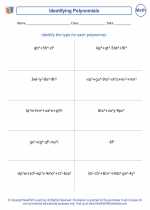
 Worksheet/Answer key
Worksheet/Answer key